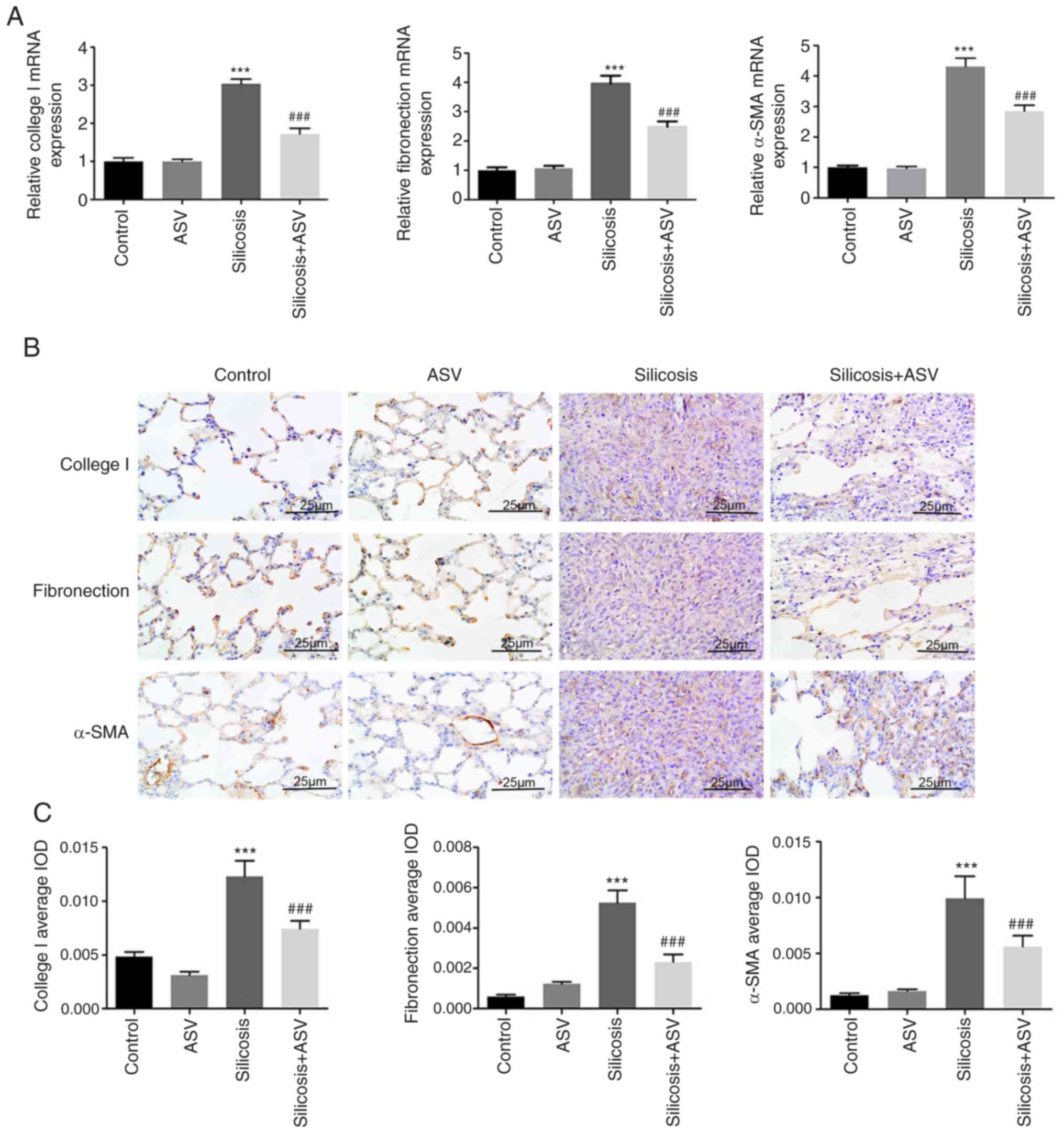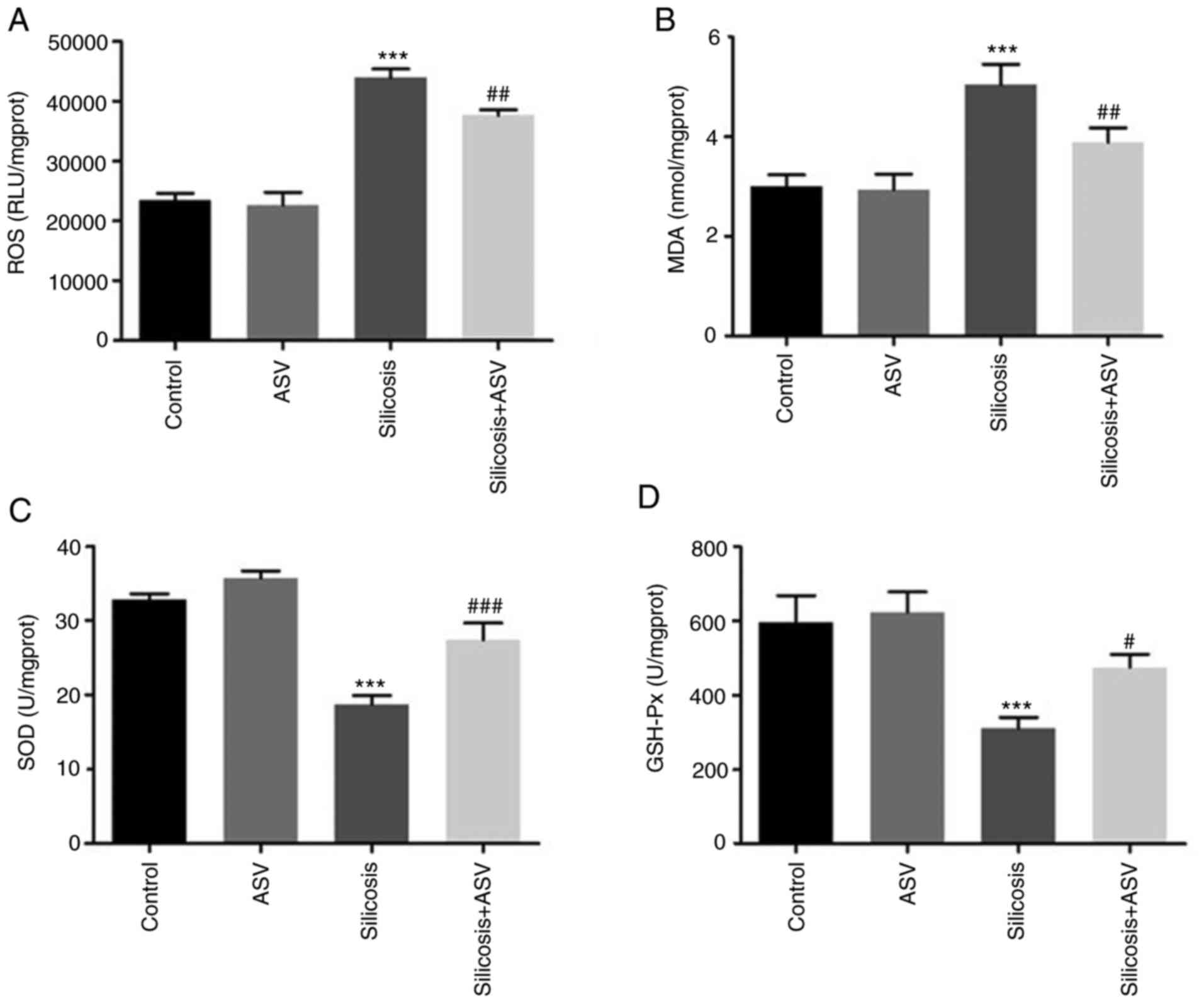|
1
|
Zhao JQ, Li JG and Zhao CX: Prevalence of
pneumoconiosis among young adults aged 24-44 years in a heavily
industrialized province of China. J Occup Health. 61:73–81. 2019.
View Article : Google Scholar : PubMed/NCBI
|
|
2
|
Ferrante P: Asbestosis and silicosis
hospitalizations in Italy (2001-2015): Results from the national
hospital discharge registry. Eur J Public Health. 29:876–882. 2019.
View Article : Google Scholar : PubMed/NCBI
|
|
3
|
Reilly MJ, Timmer SJ and Rosenman KD: The
burden of silicosis in michigan: 1988-2016. Ann Am Thorac Soc.
15:1404–1410. 2018. View Article : Google Scholar : PubMed/NCBI
|
|
4
|
Xu Q, Liu Y, Pan H, Xu T, Li Y, Yuan J, Li
P, Yao W, Yan W and Ni C: Aberrant expression of miR-125a-3p
promotes fibroblast activation via Fyn/STAT3 pathway during
silica-induced pulmonary fibrosis. Toxicology. 414:57–67. 2019.
View Article : Google Scholar : PubMed/NCBI
|
|
5
|
Hou X, Summer R, Chen Z, Tian Y, Ma J, Cui
J, Hao X, Guo L, Xu H, Wang H and Liu H: Lipid uptake by alveolar
macrophages drives fibrotic responses to silica dust. Sci Rep.
9:3992019. View Article : Google Scholar : PubMed/NCBI
|
|
6
|
Zhou Y, He Z, Gao Y, Zheng R, Zhang X,
Zhao L and Tan M: Induced pluripotent stem cells inhibit
bleomycin-induced pulmonary fibrosis in mice through suppressing
TGF-β1/Smad-mediated epithelial to mesenchymal transition. Front
Pharmacol. 7:4302016. View Article : Google Scholar
|
|
7
|
Li PF, He RH, Shi SB, Li R, Wang QT, Rao
GT and Yang B: Modulation of miR-10a-mediated TGF-β1/Smads
signaling affects atrial fibrillation-induced cardiac fibrosis and
cardiac fibroblast proliferation. Biosci Rep. 39:BSR201819312019.
View Article : Google Scholar
|
|
8
|
Lu Y, Zhang T, Shan S, Wang S, Bian W, Ren
T and Yang D: MiR-124 regulates transforming growth factor-β1
induced differentiation of lung resident mesenchymal stem cells to
myofibroblast by repressing Wnt/β-catenin signaling. Dev Biol.
449:115–121. 2019. View Article : Google Scholar : PubMed/NCBI
|
|
9
|
Bellaye PS, Shimbori C, Upagupta C, Sato
S, Shi W, Gauldie J, Ask K and Kolb M: Lysyl oxidase-like 1 protein
deficiency protects mice from adenoviral transforming growth
factor-β1-induced pulmonary fibrosis. Am J Respir Cell Mol Biol.
58:461–470. 2018. View Article : Google Scholar
|
|
10
|
Li LC and Kan LD: Traditional Chinese
medicine for pulmonary fibrosis therapy: Progress and future
prospects. J Ethnopharmacol. 198:45–63. 2017. View Article : Google Scholar : PubMed/NCBI
|
|
11
|
Meng LQ, Tang JW, Wang Y, Zhao JR, Shang
MY, Zhang M, Liu SY, Qu L, Cai SQ and Li XM: Astragaloside IV
synergizes with ferulic acid to inhibit renal tubulointerstitial
fibrosis in rats with obstructive nephropathy. Br J Pharmacol.
162:1805–1818. 2011. View Article : Google Scholar : PubMed/NCBI
|
|
12
|
Yu WN, Sun LF and Yang H: Inhibitory
effects of astragaloside IV on bleomycin-induced pulmonary fibrosis
in rats via attenuation of oxidative stress and inflammation.
Inflammation. 39:1835–1841. 2016. View Article : Google Scholar : PubMed/NCBI
|
|
13
|
Wang L, Chi YF, Yuan ZT, Zhou WC, Yin PH,
Zhang XM, Peng W and Cai H: Astragaloside IV inhibits renal
tubulointerstitial fibrosis by blocking TGF-β/Smad signaling
pathway in vivo and in vitro. Exp Biol Med (Maywood).
239:1310–1324. 2014. View Article : Google Scholar
|
|
14
|
Sangomla S, Saifi MA, Khurana A and Godugu
C: Nanoceria ameliorates doxorubicin induced cardiotoxicity:
Possible mitigation via reduction of oxidative stress and
inflammation. J Trace Elem Med Biol. 47:53–62. 2018. View Article : Google Scholar : PubMed/NCBI
|
|
15
|
Ohkawa H, Ohishi N and Yagi K: Assay for
lipid peroxides in animal tissues by thiobarbituric acid reaction.
Anal Biochem. 95:351–358. 1979. View Article : Google Scholar : PubMed/NCBI
|
|
16
|
Tsang CK, Liu Y, Thomas J, Zhang Y and
Zheng XF: Superoxide dismutase 1 acts as a nuclear transcription
factor to regulate oxidative stress resistance. Nat Commun.
5:34462014. View Article : Google Scholar : PubMed/NCBI
|
|
17
|
Voicu SN, Balas M, Stan MS, Trică B,
Serban AI, Stanca L, Hermenean A and Dinischiotu A: Amorphous
silica nanoparticles obtained by laser ablation induce inflammatory
response in human lung fibroblasts. Materials (Basel). 12:10262019.
View Article : Google Scholar
|
|
18
|
Moron MS, Depierre JW and Mannervik B:
Levels of glutathione, glutathione reductase and glutathione
S-transferase activities in rat lung and liver. Biochim Biophys
Acta. 582:67–78. 1979. View Article : Google Scholar : PubMed/NCBI
|
|
19
|
Wang J, Ni G, Liu Y, Han Y, Jia L and Wang
Y: Tanshinone IIA promotes axonal regeneration in rats with focal
cerebral ischemia through the inhibition of
nogo-A/NgR1/RhoA/ROCKII/MLC signaling. Drug Des Devel Ther.
14:2775–2787. 2020. View Article : Google Scholar : PubMed/NCBI
|
|
20
|
Chen X, Chen Y, Hou Y, Song P, Zhou M, Nie
M and Liu X: Modulation of proliferation and differentiation of
gingiva-derived mesenchymal stem cells by concentrated growth
factors: Potential implications in tissue engineering for dental
regeneration and repair. Int J Mol Med. 44:37–46. 2019.PubMed/NCBI
|
|
21
|
Li N, Feng F, Wu K, Zhang H, Zhang W and
Wang W: Inhibitory effects of astragaloside IV on silica-induced
pulmonary fibrosis via inactivating TGF-β1/Smad3 signaling. Biomed
Pharmacother. 119:1093872019. View Article : Google Scholar
|
|
22
|
Bagnato G and Harari S: Cellular
interactions in the pathogenesis of interstitial lung diseases. Eur
Respir Rev. 24:102–114. 2015. View Article : Google Scholar : PubMed/NCBI
|
|
23
|
Li J, Yao W, Hou JY, Zhang L, Bao L, Chen
HT, Wang D, Yue ZZ, Li YP, Zhang M and Hao CF: Crystalline silica
promotes rat fibrocyte differentiation in vitro, and fibrocytes
participate in silicosis in vivo. Biomed Environ Sci. 30:649–660.
2017.PubMed/NCBI
|
|
24
|
Phillips RJ, Burdick MD, Hong K, Lutz MA,
Murray LA, Xue YY, Belperio JA, Keane MP and Strieter RM:
Circulating fibrocytes traffic to the lungs in response to CXCL12
and mediate fibrosis. J Clin Invest. 114:438–446. 2004. View Article : Google Scholar : PubMed/NCBI
|
|
25
|
Cheng F, Shen Y, Mohanasundaram P,
Lindström M, Ivaska J, Ny T and Eriksson JE: Vimentin coordinates
fibroblast proliferation and keratinocyte differentiation in wound
healing via TGF-β-Slug signaling. Proc Natl Acad Sci USA.
113:E4320–E4327. 2016. View Article : Google Scholar
|
|
26
|
Stan MS, Sima C, Cinteza LO and
Dinischiotu A: Silicon-based quantum dots induce inflammation in
human lung cells and disrupt extracellular matrix homeostasis. FEBS
J. 282:2914–2929. 2015. View Article : Google Scholar : PubMed/NCBI
|
|
27
|
Huang H, Chen M, Liu F, Wu H, Wang J, Chen
J, Liu M and Li X: N-acetylcysteine tiherapeutically protects
against pulmonary fibrosis in a mouse model of silicosis. Biosci
Rep. 39:BSR201906812019. View Article : Google Scholar : PubMed/NCBI
|
|
28
|
Hou J, Ma T, Cao H, Chen Y, Wang C, Chen
X, Xiang Z and Han X: TNF-α-induced NF-κB activation promotes
myofibroblast differentiation of LR-MSCs and exacerbates
bleomycin-induced pulmonary fibrosis. J Cell Physiol.
233:2409–2419. 2018. View Article : Google Scholar
|
|
29
|
Zheng ZC, Zhu W, Lei L, Liu XQ and Wu YG:
Wogonin ameliorates renal inflammation and fibrosis by inhibiting
NF-κB and TGF-β1/Smad3 signaling pathways in diabetic nephropathy.
Drug Des Devel Ther. 14:4135–4148. 2020. View Article : Google Scholar :
|
|
30
|
Song C, He L, Zhang J, Ma H, Yuan X, Hu G,
Tao L, Zhang J and Meng J: Fluorofenidone attenuates pulmonary
inflammation and fibrosis via inhibiting the activation of NALP3
inflammasome and IL-1β/IL-1R1/MyD88/NF-κB pathway. J Cell Mol Med.
20:2064–2077. 2016. View Article : Google Scholar : PubMed/NCBI
|
|
31
|
Robinson JM: Reactive oxygen species in
phagocytic leukocytes. Histochem Cell Biol. 130:281–297. 2008.
View Article : Google Scholar : PubMed/NCBI
|
|
32
|
Mittal M, Siddiqui MR, Tran K, Reddy SP
and Malik AB: Reactive oxygen species in inflammation and tissue
injury. Antioxid Redox Signal. 20:1126–1167. 2014. View Article : Google Scholar :
|
|
33
|
Lopes-Pacheco M, Ventura TG, de Oliveira
HD, Monção-Ribeiro LC, Gutfilen B, de Souza SAL, Rocco PRM,
Borojevic R, Morales MM and Takiya CM: Infusion of bone marrow
mono-nuclear cells reduces lung fibrosis but not inflammation in
the late stages of murine silicosis. PLoS One. 9:e1099822014.
View Article : Google Scholar
|
|
34
|
Kluchová Z, Petrásová D, Joppa P, Dorková
Z and Tkácová R: The association between oxidative stress and
obstructive lung impairment in patients with COPD. Physiol Res.
56:51–56. 2007.
|
|
35
|
Liu H, Fang S, Wang W, Cheng Y, Zhang Y,
Liao H, Yao H and Chao J: Macrophage-derived MCPIP1 mediates
silica-induced pulmonary fibrosis via autophagy. Part Fibre
Toxicol. 13:552016. View Article : Google Scholar : PubMed/NCBI
|
|
36
|
Guo J, Fang Y, Jiang F, Li L, Zhou H, Xu X
and Ning W: Neohesperidin inhibits TGF-β1/Smad3 signaling and
alleviates bleomycin-induced pulmonary fibrosis in mice. Eur J
Pharmacol. 864:1727122019. View Article : Google Scholar
|
|
37
|
Chang X, Tian M, Zhang Q, Gao J, Li S and
Sun Y: Nano nickel oxide promotes epithelial-mesenchymal transition
through transforming growth factor β1/smads signaling pathway in
A549 cells. Environ Toxicol. 35:1308–1317. 2020. View Article : Google Scholar : PubMed/NCBI
|






















